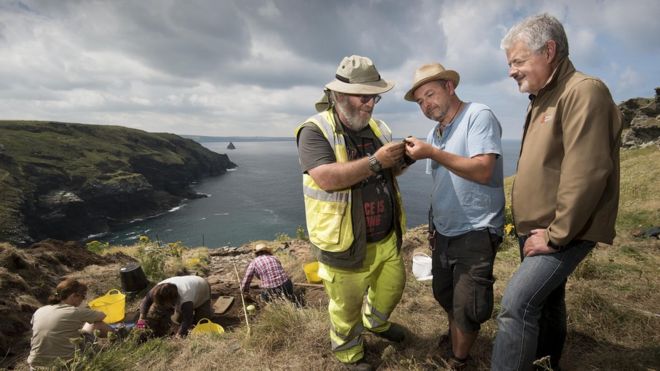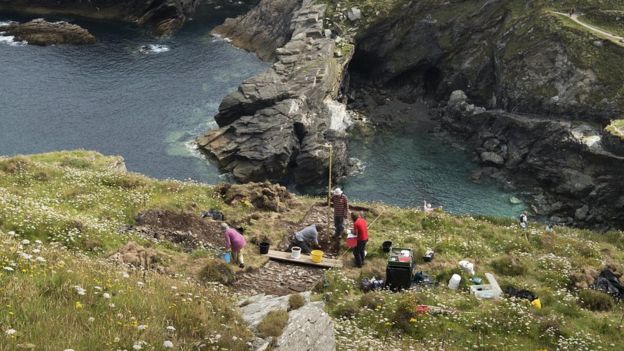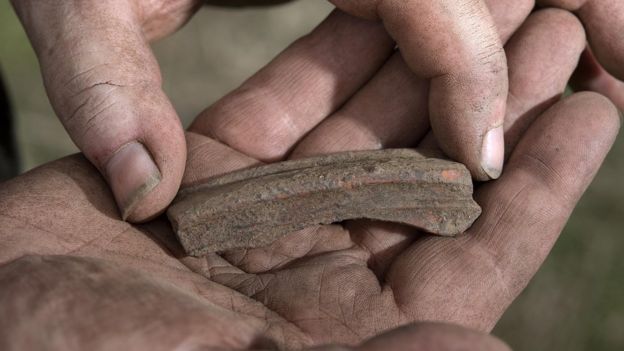Monday 29 August 2016
Friday 26 August 2016
Thursday 25 August 2016
Monday 8 August 2016
IULII CAESARIS
C. IULII CAESARIS
tionem continebat timorisque opinionem, quibus-15 cumque poterat rebus, augebat.
The Gauls 58. Cum maiore in dies contemptione Indutio-
attacking are , . 1
crushed and marus ad castra accederet, nocte una intromissis
leader siam. eqUjt;bus omnium finitimarum civitatum, quos arcessendos curaverat, tanta diligentia omnes suos 5 custodiis intra castra continuit, ut nulla ratione ea res enuntiari aut ad Treveros perferri posset. Interim ex consuetudine cotidiana Indutiomarus ad castra accedit atque ibi magnam partem diei consumit; equites tela coniciunt et magna cum io contumelia verborum nostros ad pugnam evocant. Nullo ab nostris dato responso, ubi visum est, sub vesperum dispersi ac dissipati discedunt. Subito Labienus duabus portis omnem equitatum emittit; praecipit atque interdicit, proterritis hostibus atque 15 in fugam coniectis (quod fore, sicut accidit, vide-bat) unum omnes peterent Indutiomarum, neu quis quern prius vulneret, quam ilium interfectum viderit, quod mora reliquorum spatium nactum ilium effugere nolebat; magna proponit iis, qui 20 occiderint, praemia ; submittit cohortes equitibus subsidio. Comprobat hominis consilium fortuna, et cum unum omnes peterent, in ipso fluminis vado deprehensus Indutiomarus interficitur caputque eius refertur in castra ; redeuntes equites, quos possunt, 25 consectantur atque occidunt. Hac re cognita omnes Eburonum et Nerviorum, quae convenerant, copiae discedunt, pauloque habuit post id factum Caesar quietiorem Galliam.
C. JULIUS Caesar
of the belief of his fear, by which the 15-and whatever methods he could.
The Gauls 58. Cum maiore in dies contemptione Indutio-
attacking are , . 1
crushed and Marus up to the camp, been admitted in one night,
Leader the church. e q U j T ; bus of the neighboring states, which taken care to have sent for, with such great care that all his men within the camp by prisoners to a 5, so that he could by no means be reported or carried to the Treviri. In the meantime, according to his daily to the camp and spends a great part of the day; io his horse cast their weapons, and with very insulting language call out our men to battle. No reply being given by our men, when they thought proper, depart toward evening in a disorderly and scattered manner. , Labienus unexpectedly sends out all the cavalry by two gates; gives this command and prohibition, that, when the enemy, and 15 were put to flight (which he foresaw would happen, as it see-bat), they should all make for Indutiomarus that no one whom she had earlier slain, the slain man, than that he sees him, he did not want to escape him of gaining time by the delay over the rest; He offers great rewards to those who should kill him: 20, and the reward; sends troops to support the horse.The issue justifies the policy of the man, and when they all aimed at Indutiomarus is slain and his head was caught in the very ford of the river back to the camp; horse, when returning, all whom they can, 25, pursue and kill each other. This affair having been known, all of the Eburones and the Nervii, who had come together, the forces go away, and a little more tranquil it was after that that was the Caesar to Gaul.
mengele english: The Gauls
mengele english: The Gauls: tionem continebat timorisque opinionem, quibus-15 cumque poterat rebus, augebat. The Gauls 58 . Cum maiore in dies contemptione Indutio-...
The Gauls
tionem continebat timorisque opinionem, quibus-15 cumque poterat rebus, augebat.
The Gauls 58. Cum maiore in dies contemptione Indutio-
attacking are , , 1
crushed and marus ad castra accederet, nocte una intromissis
leader slam. equitibus omnium finitimarum civitatum, quos arcessendos curaverat, tanta diligentia omnes suos 5 custodiis intra castra continuit, ut nulla ratione ea res enuntiari aut ad Treveros perferri posset. Interim ex consuetudine cotidiana Indutiomarus ad castra accedit atque ibi magnam partem diei consumit; equites tela coniciunt et magna cum jo contumelia verborum nostros ad pugnam evocant. Nullo ab nostris dato responso, ubi visum est, sub vesperum dispersi ac dissipati discedunt. Subito Labienus duabus portis omnem equitatum emittit; praecipit atque interdicit, proterritis hostibus atque 15 in fugam coniectis (quod fore, sicut accidit, vide-bat) unum omnes peterent Indutiomarum, neu quis quem prius vulneret, quam ilium interfectum viderit, quod mora reliquorum spatium nactum ilium effugere nolebat; magna proponit iis, qui 20 occiderint, praemia ; submittit cohortes equitibus subsidio. Comprobat hominis consilium fortuna, et cum unum omnes peterent, in ipso fluminis vado deprehensus Indutiomarus interficitur caputque eius refertur in castra ; redeuntes equites, quos possunt, 25 consectantur atque occidunt. Hac re cognita omnes Eburonum et Nerviorum, quae convenerant, copiae discedunt, pauloque habuit post id factum Caesar quietiorem Galliam.
Saturday 6 August 2016
Archaeologists have unearthed walls about 1m (3ft) thick at Tintagel Castle in Cornwall
 Image copyrightENGLISH HERITAGE
Image copyrightENGLISH HERITAGE
The royal residence of 6th Century rulers is believed to have been discovered at the legendary birthplace of King Arthur.
Archaeologists have unearthed walls about 1m (3ft) thick at Tintagel Castle in Cornwall in the first excavation of a five-year English Heritage project.
It is thought the walls formed part of the seat of the rulers of the early medieval kingdom of Dumnonia.
Winn Scutt from English Heritage said it was a "very dense settlement".
"It's a complex of buildings and many people since the 1980s have argued that it's a royal centre, and that it's the royal centre of the kingdom of Dumnonia", the properties curator said.
"We haven't found any others, so it's quite possible that this was the centre, and maybe they were static."
 Image copyrightENGLISH HERITAGE
Image copyrightENGLISH HERITAGE
Some of the buildings had been excavated in the 1930s by the British archaeologist Ralegh Radford who had thought they formed part of a monastery, Mr Scutt said.
He added the excavations did not tell us "anything" about King Arthur, the legendary ruler who was conceived at Tintagel Castle according to the 12th Century writer Geoffrey of Monmouth.
Discoveries at the site also include large amounts of pottery from the eastern Mediterranean used for olive oil and wine, as well as Merovingian glass and fine Phocaean tableware from the west coast of Turkey.
 Image copyrightENGLISH HERITAGE
Image copyrightENGLISH HERITAGE
Mr Scutt said the richness of the discoveries made Tintagel "one of the most important sites in western Europe".
"It isn't just a trading centre to move olive oil around, they're actually indulging in it, they're feasting here", he said.
English Heritage has appointed Cornwall Archaeological Unit (CAU) to carry out the excavations which form the first major research project of the area since the 1990s.
Archaeologists have unearthed walls about 1m (3ft) thick at Tintagel Castle in Cornwall
 Image copyrightENGLISH HERITAGE
Image copyrightENGLISH HERITAGE
The royal residence of 6th Century rulers is believed to have been discovered at the legendary birthplace of King Arthur.
Archaeologists have unearthed walls about 1m (3ft) thick at Tintagel Castle in Cornwall in the first excavation of a five-year English Heritage project.
It is thought the walls formed part of the seat of the rulers of the early medieval kingdom of Dumnonia.
Winn Scutt from English Heritage said it was a "very dense settlement".
"It's a complex of buildings and many people since the 1980s have argued that it's a royal centre, and that it's the royal centre of the kingdom of Dumnonia", the properties curator said.
"We haven't found any others, so it's quite possible that this was the centre, and maybe they were static."
 Image copyrightENGLISH HERITAGE
Image copyrightENGLISH HERITAGE
Some of the buildings had been excavated in the 1930s by the British archaeologist Ralegh Radford who had thought they formed part of a monastery, Mr Scutt said.
He added the excavations did not tell us "anything" about King Arthur, the legendary ruler who was conceived at Tintagel Castle according to the 12th Century writer Geoffrey of Monmouth.
Discoveries at the site also include large amounts of pottery from the eastern Mediterranean used for olive oil and wine, as well as Merovingian glass and fine Phocaean tableware from the west coast of Turkey.
 Image copyrightENGLISH HERITAGE
Image copyrightENGLISH HERITAGE
Mr Scutt said the richness of the discoveries made Tintagel "one of the most important sites in western Europe".
"It isn't just a trading centre to move olive oil around, they're actually indulging in it, they're feasting here", he said.
English Heritage has appointed Cornwall Archaeological Unit (CAU) to carry out the excavations which form the first major research project of the area since the 1990s.
Subscribe to:
Posts (Atom)